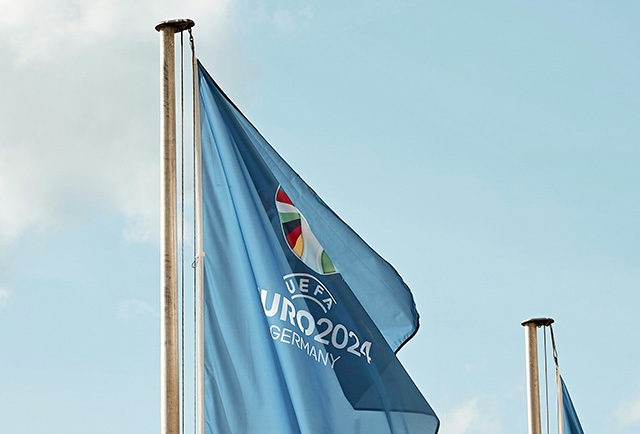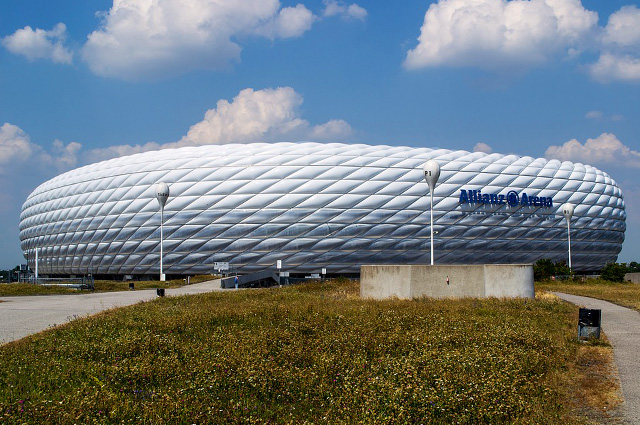The UEFA European Championship (the Euros) is one of the top soccer (football) competitions worldwide. It’s a highly anticipated football tournament featuring 24 national teams from Europe. Euro 2024 was the 17th time the tournament had been held, from 14 June to 14 July, 2024.
 UEFA Euro 2024
UEFA Euro 2024After Italy’s victory over England last time, both sides want to overcome some of the top countries, including the Netherlands, Spain, and Germany (the host), in the upcoming event.
Stadiums Hosting Euro 2024
There are 10 stadiums chosen to host matches, all in Germany, which include:
- Allianz Arena (Munich) – This stadium holds 66,000 people.
- Olympiastodion (Berlin) – The stadium’s capacity is 71,000.
- Stuttgart Arena – This arena can hold 51,000 people and was built in 1993.
- BVB Stadion Dortmund – Dortmund has evolved into a large tech hub and features a rich sporting heritage. Its stadium holds 62,000 people.
- Arena AufSchalke (Gelsenkirchen) – The Gelsenkirchen stadium holds 50,000 people.
- Volksparkstadion (Hamburg) – Though built in 1953, the Volksparkstadion in Hamburg was upgraded in 2000 and holds 49,000 people.
- Frankfurt Arena – Frankfurt is the fifth-largest city in Germany, and its stadium holds 47,000 people. The arena was built in 1925; it has since hosted many major tournaments. Also called the Waldstadion.
- Leipzig Stadium – The Leipzig Stadium opened in 2004 after being rebuilt inside the Zentralstadion, the largest stadium in East Germany. It holds 40,000 people.
- Cologne Stadium – The Cologne stadium’s capacity is 43,000.
- Dusseldorf Arena – Dusseldorf has over 250 restaurants and beer houses in the Old Town; people call it the longest bar in the world. Its arena holds 47,000 people, and the home team is Fortuna Dusseldorf.
 Allianz Arena will host matches at Euro 2024
Allianz Arena will host matches at Euro 2024 Qualified Countries
As hosts, Germany automatically qualified.
These 20 teams also qualified: Belgium, France, Portugal, Scotland, Spain, Turkey, Austria, England, Hungary, Slovakia, Albania, Denmark, Netherlands, Romania, Switzerland, Serbia, Czech Republic, Italy, Slovenia, Croatia.
Play-offs were held in March 2024 to decide the last three places: Georgia, Ukraine and Poland.
Russia was banned from competing.
Group Stages
The group stage serves as the initial phase of the tournament. The format of group stages was similar to Euro 2020. It consisted of the 24 national teams divided into six groups of four teams each.
Group A: Germany, Scotland, Switzerland, Hungary
Group B: Spain, Italy, Croatia, Albania
Group C: England, Denmark, Serbia, Slovenia
Group D: France, Netherlands, Poland, Austria
Group E: Belgium, Romania, Slovakia, Ukraine
Group F: Portugal, Türkiye, Czechia, Georgia
Group Format
During this stage, each team played three matches against the other teams in their group, following a round-robin format. Teams were awarded three points for a win, one point for a draw, and no points for a loss.
The top two teams from each group automatically advanced to the knockout stages, along with the four best third-placed teams across all groups.
After the group stage, there was a round of 16, quarterfinals, semifinals and a final. During the knockout phase, if the scores were level after the normal time finishes, teams played 30 minutes of extra time and a penalty shoot-out at the end.
Tickets To The Tournament
The Euro 2024 tournament ran from June 14 to July 14. Qualified federations and the UEFA itself oversee both sales phases. Tickets sold out very fast.
For those looking for tickets, the advice was to visit the UEFA’s ticket portal frequently to keep tabs on the options. If you wanted to buy tickets in the secondary market, there are websites like StubHub, Viagogo and EventsCompare.
Typically, tickets started at €50 for semi-final matches, and upwards of €1,000 for the finals.
Results
In the semi-finals, Spain defeated France 2–1, and England defeated The Netherlands 2–1.
Spain secured a record fourth European Championship title with a 2-1 victory over England.
Trivia
- West Germany previously hosted the event in 1988, also some games were played in Germany in the European-wide tournament of 2021.
- The tournament returned to its usual four-year cycle in 2024, after the 2020 edition was postponed until 2021 due to the pandemic.
- Nine of the ten stadium venues for Euro 2024 were used for the 2006 FIFA World Cup.
- Unlike recent years, there was no tie-breaker in place for the Golden Boot Award. Subsequently, the award was shared among six players with 3 goals each. If the previous tie-breaker rules were in place, the winner based on the most number of assists was Dani Olmo.
Related Pages
- UEFA Euro Home
- UEFA Euro Host Countries List
- UEFA Euro Winners List
- UEFA Euro Trivia
- List of UEFA Champions League Winners
- Football Stadiums in Germany
- About Sport in Germany


 Upcoming Events
Upcoming Events